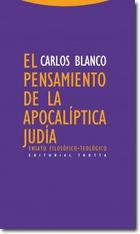Amid the theological ferment that characterized the period of the Second Temple apocalyptic stands out for its influence in rabbinic Judaism and primitive as it acquires the centrality in his speech themed eschatological Christianity.
This book examines the historical and cultural context of Jewish apocalyptic, the key features that underpin this movement and its relation to other religions of the Near East. It also addresses issues of latent philosophical cadence in his most marked, as the problem of historical determinism and the dialectic of immanence and transcendence in the image of God written. The aim is to highlight the existence of a Jewish apocalyptic thought, which, though "prephilosophical 'exhibits important similarities with some of the most profound reflections that have defined the Western philosophical tradition.









